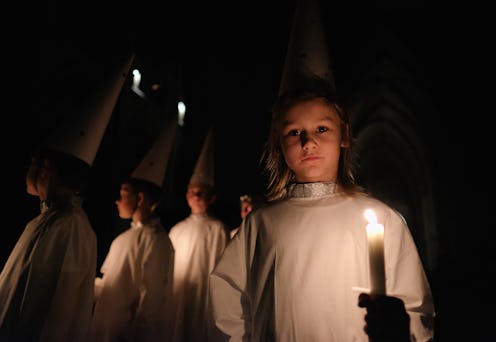News
The Church Of Sweden Is Adding More Inclusive Language Into Its Prayers

Is God a man or a woman? According to one national church, God doesn't fall into human gender classification at all. In updating its handbook, the Church of Sweden has adopted more inclusive language for its prayers and services. However, while the church is reportedly moving toward more gender-neutral language, it has not moved to drop all references to God as "the Lord" as some media outlets have reported.
"Everyone who wants to call God 'Lord' can remain calm," chair of the church's worship committee Sofija Pedersen Videke reportedly said in a statement to Sweden's The Local. "It is still there in many places in the new handbook. We have replaced 'he' with 'God' in one place, that's all."
Earlier multiple news outlets including the Guardian and the Telegraph had reported the Church of Sweden would ask clergy members to use only the gender-neutral word "God" rather than male identifiers such as "he," "him," or "the Lord" when referring to their religious deity. However, the Evangelical Lutheran national church refuted such reports in a press release put out Friday.
"Of course, the traditional expressions of Christian faith remain in the new worship book," the press release quoted Videke as saying. "However, some gender neutral ways of addressing God have been added in some prayers."
The Church of Sweden reportedly made the decision Thursday to adopt more inclusive language in its Worship Book following an eight-day meeting by the church's General Synod, a 251-member decision-making body. The decision comes as the church seeks to update and modernize its Worship Book, a 31-year-old handbook which reportedly includes guidelines for services, including notes about language, liturgy, and hymns.
"We talk about Jesus Christ, but in a few places we have changed it to say 'God' instead of 'he'," Videke told the Telegraph. "We have some prayer options that are more gender-neutral than others." Videke also noted she'd not heard of any priests who had objected to the new more inclusive language.
Among the updates to the Worship Book decided upon earlier this week are a move to use the grammatically female-gendered version of the term "the Holy Spirit" as is used in Hebrew. There is also a change to the language used in the introduction of the worship. In the new book, priests will reportedly be asked to begin their services with either the traditional "In the name of the Father, and the Son, and the Holy Spirit" (with Holy Spirit in its female gendered form) or with "In the name of God and the Holy Trinity."
The updated handbook will also reportedly contain a few other gender-neutral terms and phrases for various other parts of the church's liturgy. However, Videke stressed the Swedish language's official gender-neutral pronoun "hen" does not appear at all in the church's updated Worship Book.
But the Church of Sweden's move toward adopting more inclusive language may have been in the works for a while. According to the head of the Church of Sweden, Archbishop Antje Jackelen, the church has long been discussing the idea of adopting more gender-neutral or inclusive language into its services. In fact, in a statement to Sweden's TT news agency, Jackelen reportedly noted the topic had been discussed by the church's decision-making body in 1986.
Jackelen also stressed that God was not limited by human gender classifications. "Theologically, for instance, we know that God is beyond our gender determinations, God is not human," the Daily Mail reported Jackelén told TT news agency.
Although the Church of Sweden is no longer officially supported by the state (that ended in 2000 when the country disestablished the church as part of a turn toward diversity and religious freedom), it remains the largest church in Sweden.